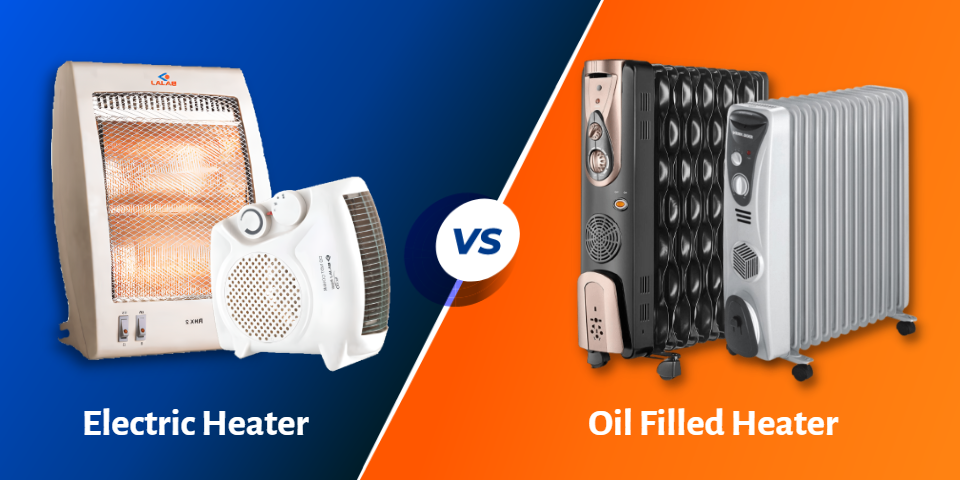While the market is perpetually awash with tons of heaters, two options that have left a long-lasting impression on buyers’ minds are Electric and Oil-Filled Heaters. While Electric heaters are generally more expensive than oil-filled heaters, they are also more efficient, lightweight, and portable.
On the contrary, Oil-filled heaters are a good choice for those who want a budget-friendly option that still provides plenty of warmth. Not sure whether to go electric or oil-filled? In that case, this guide is for you. Here, we'll compare the two types of heaters on the market, so you can decide which one is best for your home.
A Brief Introduction to Electric and Oil-Filled Heaters
Before we outline the significant differences between Electric and Oil-Filled Heaters, let’s first introduce them individually to check which is the better choice for your home.
Electric Heaters
As the name implies, an Electric Heater is a heating device that uses electricity to generate heat. Such devices are often used as a supplemental heat source in homes and businesses and can be an alternative to gas or oil-fired furnaces and boilers. These are available in various sizes and wattages to suit different needs.
Pros
- It heats up quickly.
- Easy to operate
- Lightweight and Portable
- Some electric heaters offer oscillation and directed heating features to distribute heat to all corners of the room.
- It can be used in a variety of settings
- No emissions or pollutants
Cons
- Requires power supply
- It has several safety issues, making it non-suitable for those with kids.
- Very noisy
- This device leads to high electricity bills.
- Expensive
- Requires maintenance
- It can be less efficient than other types of heaters.
Oil-Filled Heaters
An oil-filled heater, also known as an oil-filled radiator, is a type of electric space heater in which oil is used as a heat reservoir. The oil is heated by an electric element, and the heat is transferred to metal fins that radiate the heat into the room.
Oil-filled heaters are very efficient and provide a stable, steady heat source. They are often used as an alternative to central heating or other forms of electric heating.
Pros
- They are very safe.
- These heaters use less electricity than their counterparts, thus saving money on your energy bills.
- Unlike other heaters that fluctuate, an oil-filled heater will maintain a constant temperature.
- They operate quietly.
- Oil-Filled Heaters produce low-environmental impact.
Cons
- They are slow to warm.
- Such heaters are heavy, making them tough to move from one place to another.
- They might not be suitable for larger spaces.
Electric Vs. Oil-Filled Heaters - The 5 Major Differences To Know
Since electric and oil-filled heaters have pros and cons, it's essential to know the differentiating factors before making a decision. To give you a hand, we have highlighted the five significant differences between these heating devices. Read them thoroughly and spend your hard-earned cash wisely.
1. Heating Capacity
Electric heaters typically provide more heating power than oil-filled heaters, making them a better option if you need a lot of heat at once. These heaters use continuous electricity to reach their maximum temperature quickly. With these heaters, you can notice the warmth in a few minutes, making them ideal for freezing temperatures.
Some electric heaters are also fitted with oscillation features which help in blowing out the heat to all corners of the room. All in all, electric heaters are a perfect option for short-term heating.
2. Portability
Oil-filled heaters are usually heavier and more difficult to move than electric heaters, which is why they are ideal for spaces that require minimum movement. However, if you need a heater that you can easily take with you from room to room, an electric heater is the way to go.
3. Noise
While there are a lot of different factors to consider when you're trying to figure out which type of heater is best for your home, One crucial thing that you cannot afford to miss is the amount of noise that a device makes while performing.
Oil-filled heaters tend to be much quieter than electric heaters. The main reason behind the noisy operation of electric heaters is the continuous running of fans. So, if you're looking for a heater that won't make a lot of noise, then an oil-filled heater is probably your best bet.
4. Maintenance
Yet another factor that should be taken into account when purchasing a heater is overall maintenance, as there’s no point in investing in a heating device that requires too much attention and care.
Undoubtedly, electric heaters reach their maximum temperature quickly and are highly portable; they require regular maintenance owing to the continuous running of fans. Oil-Filled Heaters, on the other hand, require periodic attention, such as adding new oil and changing the wick.
5. Price
Last but not least factor you cannot overlook is the Cost. Electric heaters are typically more expensive than oil-filled heaters. Also, since they require continuous electricity to produce heat, they lead to higher electricity bills, making them non-suitable for budget-conscious buyers.
Which is Better?
That’s all about the major differences between electric and oil-filled heaters. We hope this guide will help you narrow your choice and add the rightmost heating device to your collection. Remember that the “best” choice depends on your preference and budget, but whatever option you choose, make sure it can keep you warm for an extended period.

